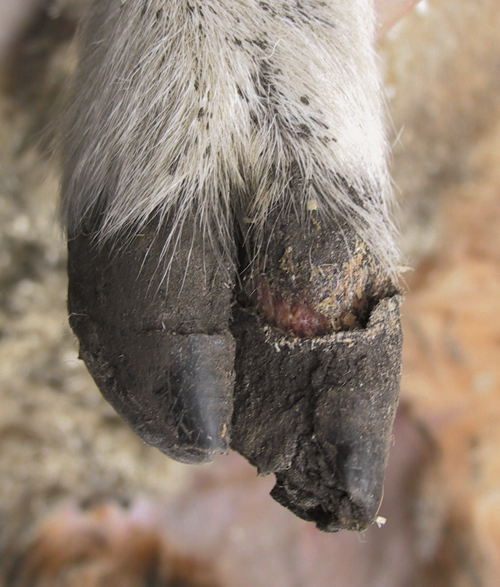Difference between revisions of "Sheep Medicine Q&A 02"
m |
|||
| Line 15: | Line 15: | ||
*virulent footrot | *virulent footrot | ||
*white line abscess | *white line abscess | ||
| − | |l1= | + | |l1=Contagious Ovine Digital Dermatitis |
|q2=What is the likely cause? | |q2=What is the likely cause? | ||
|a2= | |a2= | ||
Contagious ovine digital dermatitis is the most likely cause of lesions originating at the coronary band. There is no ready explanation why only one foot is affected. | Contagious ovine digital dermatitis is the most likely cause of lesions originating at the coronary band. There is no ready explanation why only one foot is affected. | ||
| − | |l2= | + | |l2=Contagious Ovine Digital Dermatitis |
|q3=What action would you take? | |q3=What action would you take? | ||
|a3= | |a3= | ||
All affected lame lambs should be isolated. All under-run horn is carefully removed then the foot sprayed with oxytetracycline aerosol. All lame lambs are given a single injection of long-acting oxytetracycline or tilmicosin. | All affected lame lambs should be isolated. All under-run horn is carefully removed then the foot sprayed with oxytetracycline aerosol. All lame lambs are given a single injection of long-acting oxytetracycline or tilmicosin. | ||
| − | |l3= | + | |l3=Contagious Ovine Digital Dermatitis#Treatment |
|q4=How could this condition be prevented? | |q4=How could this condition be prevented? | ||
|a4= | |a4= | ||
| Line 29: | Line 29: | ||
Strict biosecurity should help prevent introduction of the disease.<br> | Strict biosecurity should help prevent introduction of the disease.<br> | ||
Prompt attention to all lame sheep should prevent such advanced painful lesions. | Prompt attention to all lame sheep should prevent such advanced painful lesions. | ||
| − | |l4= | + | |l4=Contagious Ovine Digital Dermatitis#Prevention |
</FlashCard> | </FlashCard> | ||
Latest revision as of 14:35, 1 August 2011
| This question was provided by Manson Publishing as part of the OVAL Project. See more Sheep questions |
Severe lameness is reported affecting 2–5% of a group of 150 store lambs in mid-autumn. Typically, only one claw of one foot is affected. In all lambs there is separation of the hoof capsule of the lateral claw around the entire circumference of the coronary band with some regrowth of healthy horn at the coronary band horn. The underlying corium has a healthy smooth epithelium which does not bleed. On the medial claw the regrowth of healthy horn from the coronary band has progressed half-way down the dorsal wall with the hoof capsule thimbled at the toe. There is no associated foul smell. There are several maggots (myiasis) between the corium and hoof capsule in one foot of one lamb. In some lambs there is interdigital infection with hyperaemia, swelling, and moistening of the interdigital skin.
| Question | Answer | Article | |
| What conditions would you consider? | The most likely conditions to consider include:
|
Link to Article | |
| What is the likely cause? | Contagious ovine digital dermatitis is the most likely cause of lesions originating at the coronary band. There is no ready explanation why only one foot is affected. |
Link to Article | |
| What action would you take? | All affected lame lambs should be isolated. All under-run horn is carefully removed then the foot sprayed with oxytetracycline aerosol. All lame lambs are given a single injection of long-acting oxytetracycline or tilmicosin. |
Link to Article | |
| How could this condition be prevented? | There are no specific control measures for contagious ovine digital dermatitis. |
Link to Article | |
